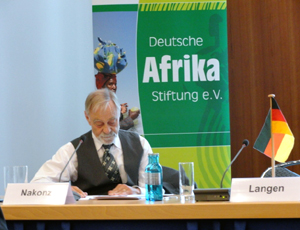
These are the words of the South African Ambassador to Germany, the Rev Makhenkesi Arnold Stofile. The Ambassador was addressing a reception co-hosted by the German Africa Foundation, German Chamber of Commerce and Industry, Africa-Verein, and Siemens AG, in Berlin today. The theme of the gathering was “Task, Challenges and Ideas”.
Ambassador Stofile continued: “From time immemorial, since the evolution of societies and nation states, human relations have always been defined by access to resources for livelihood and well-being. The search for resources, their protection and later ownership of e.g. land, minerals, animals, roots and fruits have always been defined relations. In the modern era the situation has not changed but has become more sophisticated. National interests have replaced what old sociologists called ‘human needs’. But the essence of what defines relations remains basically the same”.
Explaining his presence in Germany, the Ambassador said: “Such Diplomatic Missions are established with the mutual consent of our two states. My function in Germany largely corresponds with those of my counterpart in South Africa, Ambassador Dr Haller. They are:
“To represent the Republic of South Africa (RSA) and protect its interests in Germany within International Law. Negotiate (whenever necessary) with the Government of Germany. Promote friendly relations between our two countries and peoples. To develop and facilitate strong economic, cultural and scientific relations between our two countries”.
Referring to the economic consolidation of Africa, Rev Stofile pointed out: “We must strive to consolidate the African Agenda. This means the promotion and popularisation of NEPAD (New Economic Programme for the Development of Africa) and its programmes for the development and enhancement of Africa. African trade and investment must be aligned to regional and sub-regional Strategic Plans. It is also our task to support good governance and democratisation initiatives in Africa in partnership with the German Government and institutions.
“We will strive”, continued the Ambassador, “to strengthen our cooperation with Germany. Our two countries have cordial and dynamic relations based on mutual trust and equal partnership. Germany is our largest economic partner in Europe and our number 4 in the world. Together with Germany, we are confronting such challenges as poverty, underdevelopment in Africa, skills transfer, post-conflict reconstruction, peace and security. As non-permanent members of the UN Security Council, we consult regularly to develop common approach to our endeavours to reform the UN and other institutions of Global Governance. We work closely in promoting human rights and global political and socio-economic stability within the multi-lateral system”.
Referring to the challenges that face his mission here in Germany and those of South Africa, Ambassador Stofile explained:
“After centuries of colonial conquest followed by many decades of segregation, protest, resistance and brutal repression, our country is on the way to a fully functional and participatory democracy. A significant progress has been made towards making our country a more just and inclusive society. Our political institutions have been entrenched through four national, provincial and local government elections. Such institutions as an independent Judiciary, a Public Protector, Auditor General, Human Rights, a Gender and Electoral Commissions are strong bulwarks for our democracy.

“Therefore”, appealed the Ambassador, “we are challenged to grow the level of German investments in South Africa and vice versa. We are also challenged to come up with innovative technologies that will provide more jobs and skills for our people. The agreements between Germany and South Africa on Education, Science and Technology, Skills training, Provinces/Lände and City/City cooperatives must be made to work smarter and faster. Public Representatives could assist by organising South Africa or Africa Days in their constituencies. This would afford us the opportunity to explain our challenges properly to a broader public”.
In conclusion, Ambassador Makhenkesi Arnold Stofile, had this to say.
“We are cognisant of the immensity of our responsibilities. But we also know what happens when we work together. Preparations and the hosting of the 2010 FIFA World Cup started with Germany and South Africa working together since 2004 already to prepare for the 2006 World Cup in Germany. The history of South Africa/Germany is very long. Of course it has not always been positive. But that is what diplomatic missions are for – to iron out problematic areas. Some German Companies have been in South Africa for more than 150 years. We have climbed many hills together. We dare not stop now”.
